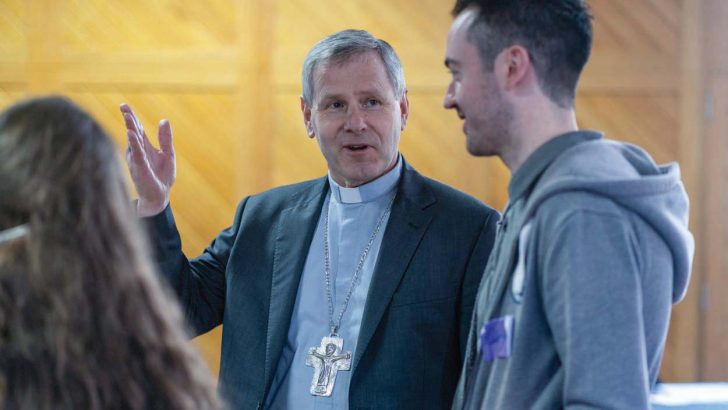The Diocese of Cork and Ross, covering Cork city and other parts of County, is home to 68 parishes and boasts a Catholic population of 227,900. The bishop of the diocese is Bishop Fintan Gavin, who was appointed in April 2019.
The Diocese of Cork and Ross implemented three channels of engagement for synodal participants: An online questionnaire; two listening meetings with a random sample of parishes across the diocese, urban and rural and focus groups with people from a cross section of society both those who feel a connection with church and those who experience disconnection and/or marginalisation.
The Diocese reported that fifty-five percent of the people who completed the questionnaire were over the age of 50 and 215 people participated in round table conversations representing 21 of the 68 parishes across the diocese. More than 100 young people in the 13-18 age group responded to a questionnaire through the post-primary schools. Conversations were facilitated and recorded by volunteers from parishes and school chaplaincy.
Being Catholic in a cold climate
The societal changes of individualism, isolation, status, materialism, being constantly busy, and consumerism were underlined as contributors to people experiencing disconnection and stress in our modern world.
A sense of loss at the current state of the Church
There was deep sorrow expressed at the Church’s inability to now attract people into its midst and the struggles faced by parishioners in the Diocese. The lack of full churches, meaningful liturgical experiences and rituals from the past were all points that instilled sorrow in participants.
Regret at the absence of marginalised groups during gatherings
The Diocese of Cork and Ross announced while it offered the opportunity for the disengaged or marginalised to appear, groups representing the Traveller community, LGBTI+, parents of young children and established clubs/groups for young people and young adults expressed no desire to appear, with their reasons ranging from their anti-religious, non-denominational and non-religious stances. Consequently, these groups were not represented at any of the Diocese’s synodal meetings. In spite of the absence of these groups, there was still a strong message expressing the need to invite, welcome, and include all those who may currently feel marginalised, alienated or excluded from the Church by the faithful during these gatherings.
Dysfunction of some lay initiatives
There was an opinion based on the experience of lay participation in the leadership of the Church at local parish level (Parish Pastoral Councils / Parish Assemblies) that certain lay initiatives have proven ineffective in the Diocese. Someare very active while many are inactive or dormant. The participants agreed that there needs to be a plan to support clergy in developing their capacity and abilities to help the people recognise their baptismal right to hold meaningful leadership roles with appropriate responsibility and authority
The need for adult-faith formation
There was a regular acknowledgement of the lack of and need for a continuing adult faith formation. This is desired in order to engage in generative dialogue which will develop the capacity of people to evangelise. The Alpha experience as a way to achieve this was suggested a number of times. People wish to be able to proclaim the Good News with confidence and authority. This will then lead to capacity building, for sacramental preparation at parish level, to provide a more enriched and vibrant experience for those preparing to receive a sacrament.
Non-native Catholics feeling left out of celebrations
There was a high level of energy around the lack of inclusion of people from other cultures and ethnic groups. People from these groups who participated in the listening process, experienced a lack of appreciation of their own cultural rituals and practices, especially during the celebration of Sunday Mass. There is a strong message expressing the need to invite, welcome, and include all those who may currently feel marginalised, alienated or excluded from our Church.
Slow pace of change in Church
There has been a frustration and an impatience with the pace of change in the Church. However, it was also acknowledged that the Church is at a tipping point, ripe with opportunity, and for the mission of the church to thrive, and that we need to embrace many of the ideas contained herein and translate them into action by creating and implementing practical and relevant plans, stated in a language that all can understand.
The desire to belong
A deep need for belonging underpinned all conversations. The need to feel invited and welcomed and encouraged to engage and participate was expressed as a hunger which is symptomatic of where people are at in our world today.


 Bishop Fintan Gavin chatting with a young man.
Bishop Fintan Gavin chatting with a young man. 
